
Deep Autumn vs Deep Winter: A Deep-Dive Comparison
For those with striking, rich coloring, the Deep Autumn and Deep Winter color seasons can feel closely related. Both seasons share depth as their primary characteristic, but there are distinct qualities that set them apart.
Whether you're trying to figure out if you're a Deep Autumn or a Deep Winter, this guide will help you understand the similarities, key differences, and practical tips for distinguishing between the two.
Table of Contents
- Similarities Between Deep Autumn and Deep Winter
- Differences Between Deep Autumn and Deep Winter
- Colors to Drape to Differentiate Between Deep Autumn and Deep Winter
- The Lipstick Test: Deep Autumn vs. Deep Winter
- Use the Vivaldi Color Lab App for a Quick Comparison
Similarities Between Deep Autumn and Deep Winter
1. Depth of Coloring
Both Deep Autumn and Deep Winter fall within the "deep" category. Compared to other seasons, Deep Autumns and Deep Winters are generally darker and have higher contrast relative to their skin.
2. Tolerance for Saturation
Deep Autumns and Deep Winters can handle medium to high levels of color saturation. This means they both suit bold, strong colors that might be overpowering for other, lighter seasons.
3. Shared Colors
Both seasons can wear certain dark colors that match the depth of their features, like dark teal and some shades of burgundy. These colors harmonize with their natural depth and help bring out the intensity in their eyes, hair, and skin.
Differences Between Deep Autumn and Deep Winter
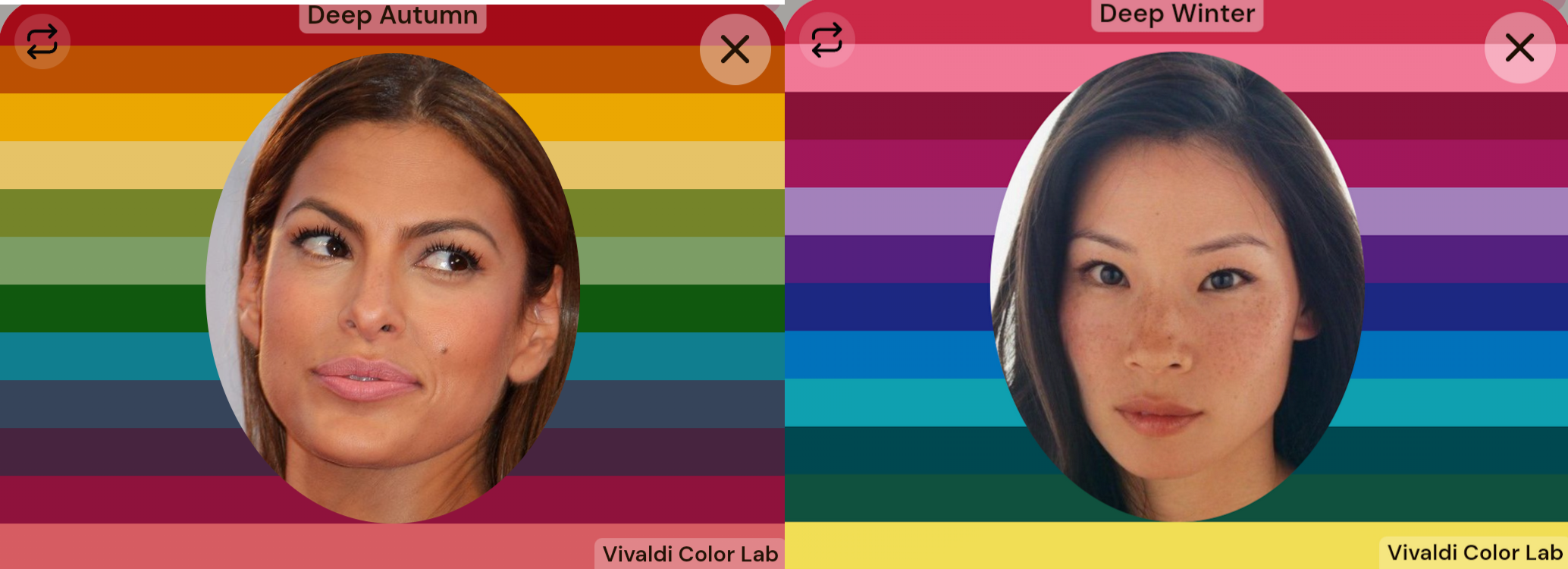
1. Undertone The primary difference lies in undertone.
- Deep Autumn has warmer undertones with a hint of golden warmth that adds richness.
- Deep Winter has cooler undertones, often with a slightly icy or bluish cast.
2. Brightness
- Deep Autumn leans towards a slightly muted quality, making earthy, warm shades more harmonious.
- Deep Winter can handle more vibrant, stark colors without becoming overwhelmed, making jewel tones like emerald and royal blue ideal.
3. Temperature of Colors
While both seasons can wear some shared colors, the overall temperature of their palettes is different. Deep Autumn thrives in warm, earthy colors like chocolate brown, olive green, and rust, while Deep Winter excels in cool, crisp colors like true black, navy, and icy blue.
Colors to Drape to Differentiate Between Deep Autumn and Deep Winter
To determine whether you’re a Deep Autumn or Deep Winter, try draping the following colors and observing which ones enhance your features:
- Deep Autumn Test Colors: Warm, earthy shades like rich chocolate brown, warm olive green, burnt orange, and deep gold. If these colors make your complexion glow and your eyes pop, you might be a Deep Autumn.
- Deep Winter Test Colors: Cool, intense colors like true black, navy, emerald green, and royal blue. If these colors make your skin look clear and vibrant, and your eyes appear striking, you’re likely a Deep Winter.
If both groups of colors look good, pay attention to the way your skin reacts to warmth or coolness. Deep Winters often look better in cool tones, while Deep Autumns excel in warm, rich shades.
Digital Drapes (Vivaldi Color App)
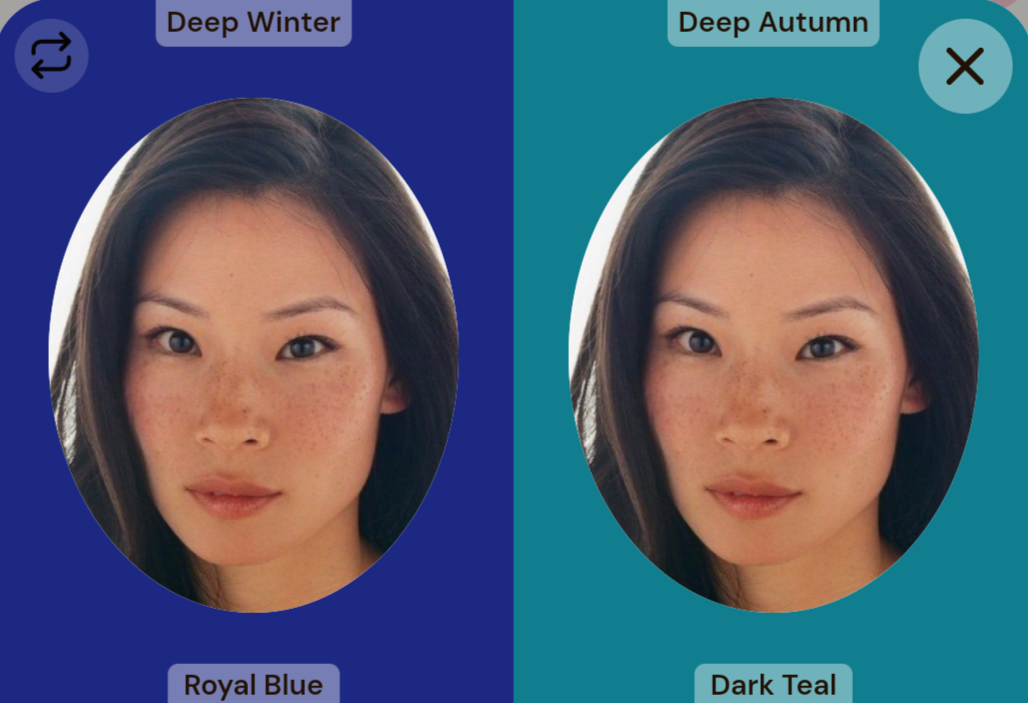
For example, Lucy Liu, who is a deep winter, shines in the cooler toned royal blue, while the dark teal does not have the same glowing effect on her skin.
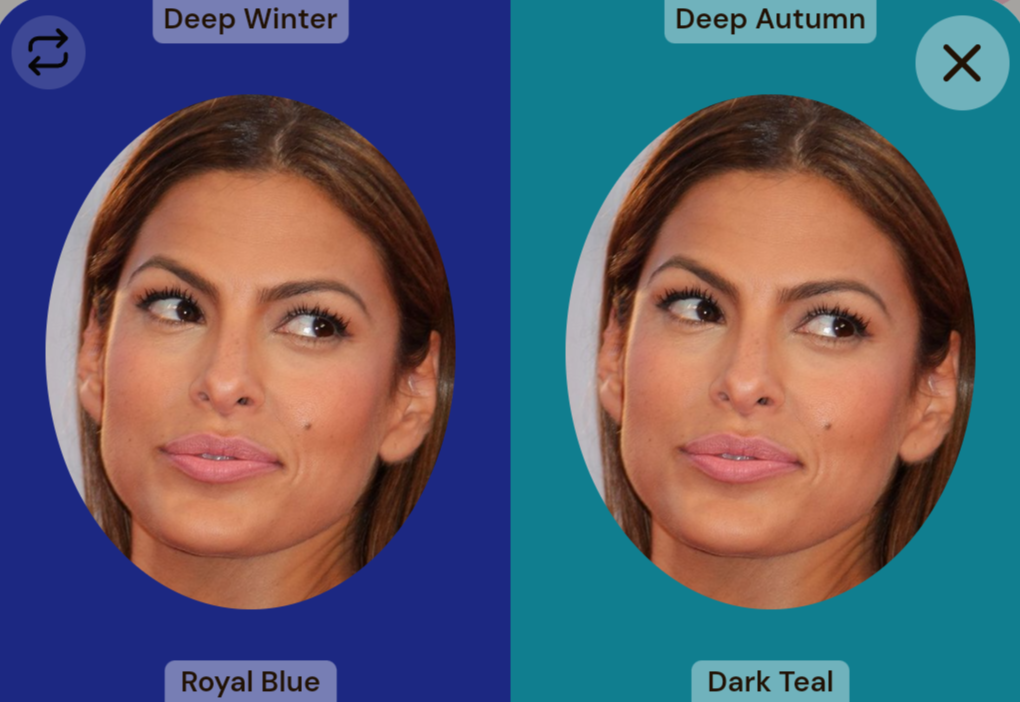
On the other hand, Eva Mendes, who is a deep autumn, shines in the warmer, rich teal, while the cooler blue clashes with her golden skin.
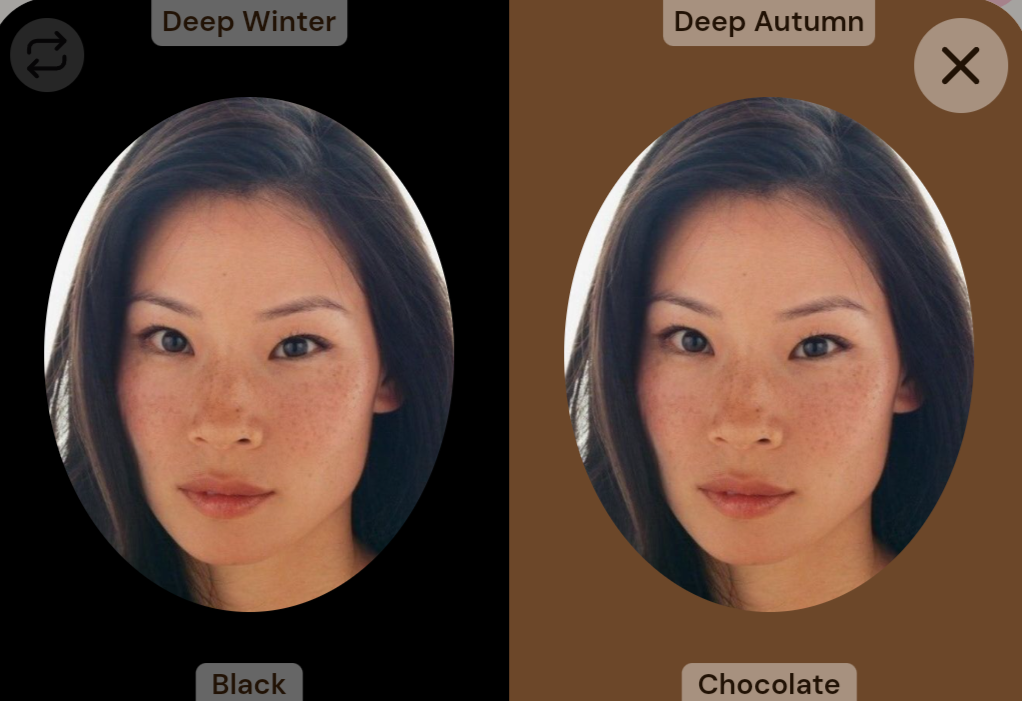
Comparing neutrals can be very effective in determining season also. Here, Lucy Liu's dark, cool leaning features harmonize perfectly with black, while the chocolate brown leans a touch too warm for her.
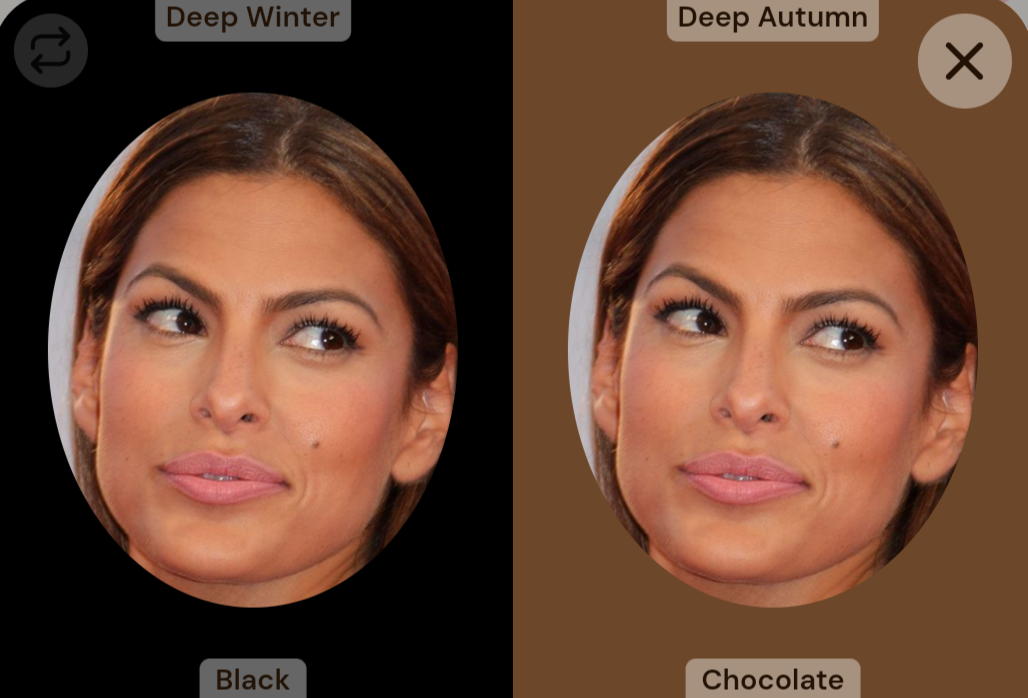
Meanwhile, the chocolate brown brings out the natural warmth in Eva Mendes' skin. While the black suits her also (Deep Winter colors will still work well on Deep Autumns, and vice versa), it's a touch too cold for her warmer coloring.
The Lipstick Test: Deep Autumn vs. Deep Winter
1. Lipstick Colors for Deep Autumn
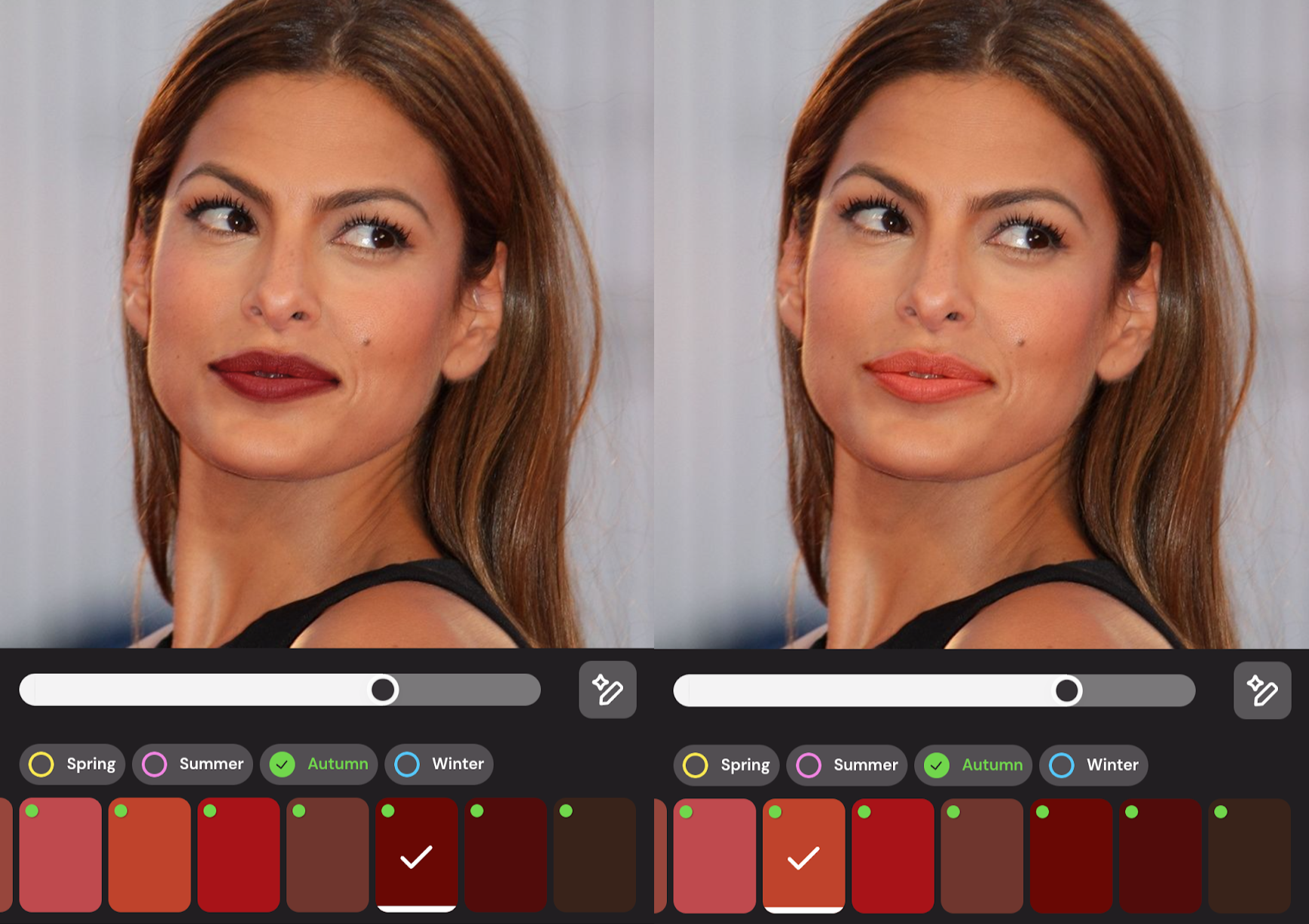
Deep Autumns shine in warm, earthy lip colors that bring out the richness of their skin tones. Using Vivaldi Color Lab's lipstick draping feature, test shades like:
- Brick red
- Warm berry
- Rich mocha
- Deep terracotta
2. Lipstick Colors for Deep Winter
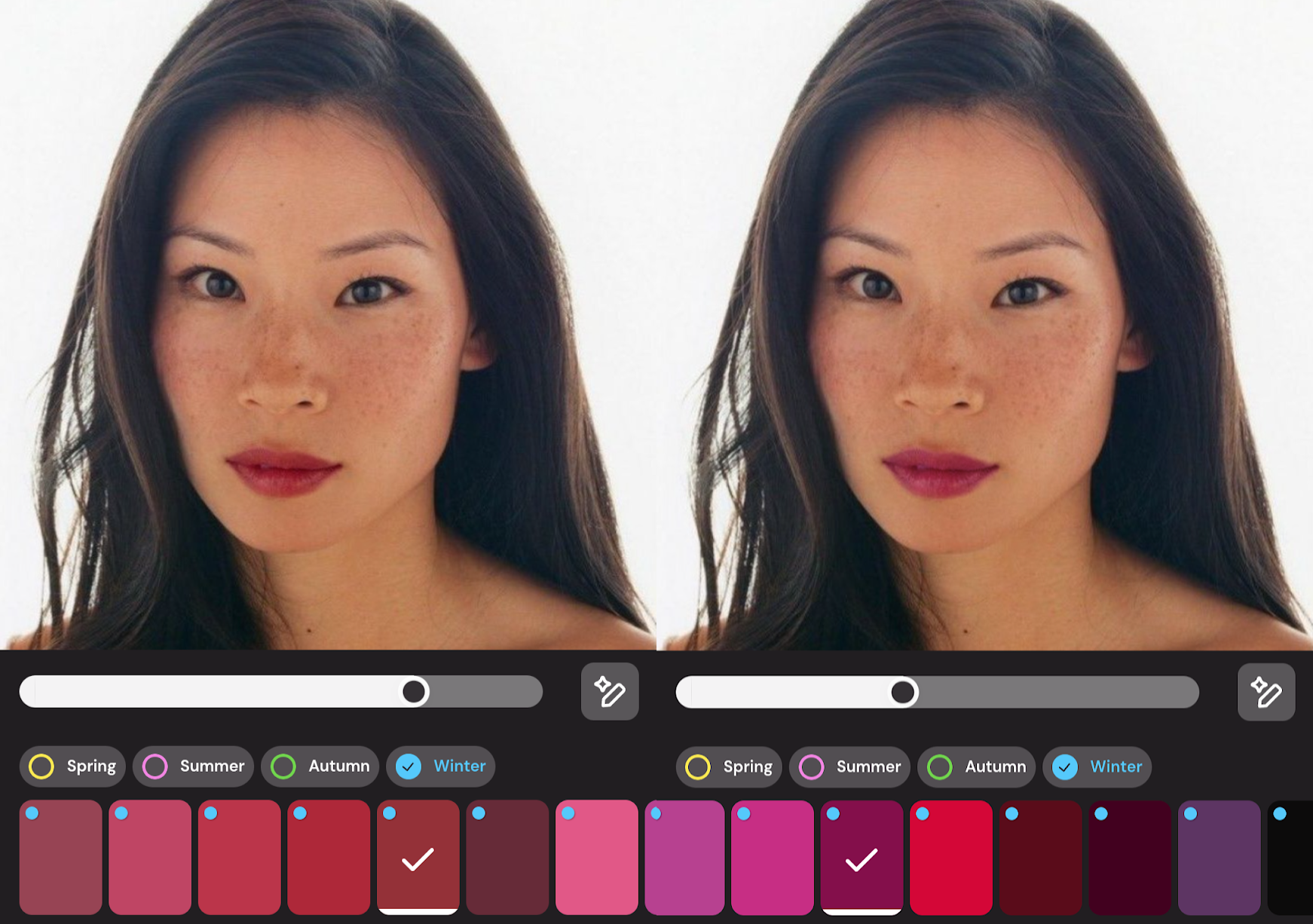
Deep Winters can wear more dramatic, cool-toned lip colors, adding contrast and vibrancy. Using Vivaldi Color Lab's lipstick draping feature, try shades like:
- Deep berry or plum
- True red with a blue base
- Dark cherry
- Burgundy
By testing these lipstick colors, you can observe which tones work best with your natural coloring. Deep Autumns will look radiant with warm, earthy lipsticks, while Deep Winters will find that cool, deep shades enhance their intensity.
Use the Vivaldi Color Lab App for a Quick Comparison
If you’re still unsure of your season, the Vivaldi Color Lab app can help. With Vivaldi’s digital drape comparisons, you can test both Deep Autumn and Deep Winter palettes to see which colors truly flatter your unique coloring.
You can also try on different lipstick shades within the app to make an informed decision, ensuring you choose the colors that bring out your natural beauty.
Whether you're a Deep Autumn or a Deep Winter, understanding your color season can help you make more intentional choices in your wardrobe, makeup, and personal style. Remember, color analysis is a tool to highlight your individuality, so enjoy experimenting with your palette and embracing the colors that make you feel confident!
Related Reading
- 5 Best Color Analysis Apps for Finding Your Season
- Zendaya's Season: Deep Autumn or Deep Winter?
- How to Choose the Perfect Lipstick Based on Your Skin Tone
- The Complete Guide to Finding Your Season
- Light Spring vs Light Summer: What's the Difference?
- Are You Low, Medium, or High Contrast?
- How to Choose the Right Winter Coat
- Winter Color Palette Guide
- Autumn Color Palette Guide
